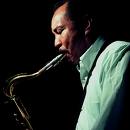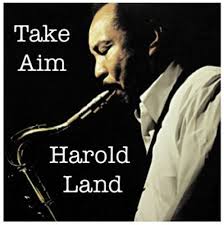As You Like It – Harold Land
Almost a "rhythm changes" head—but not quite! Another classic Harold Land workout.
- Recording: Harold Land - Take Aim
- Recorded on: July 25, 1960
- Label: Blue Note (LT 1057)
- Concert Key: F
- Vocal Range: , to
- Style: Swing (uptempo)
- Trumpet - Martin Banks
- Tenor Sax - Harold Land
- Piano - Amos Trice
- Bass - Clarence Jones
- Drums - Leon Petties
0:00
0:00
Buy MP3
Video
- Description
- Historical Notes
- Solos
- Piano Corner
- Bass Corner
- Drum Corner
- Guitar Corner
- Inside & Beyond
- Minus You
A bebop-ish workout in Land's distinctive style. The changes of the A sections on the head are almost "rhythm changes" but the sixth measure is (on the recording) usually played as B♭m7 to E♭7; on the solos it is standard rhythm changes. The bridge begins with a II-V to B♭, but the F7 on the first measure is replaced by F♯m7 and B7, a tritone sub II-V. The melody on this measure is the same as on the preceding measure, a tritone lower. The second half of the bridge has a series of II-Vs descending in half-steps from Bm7; the Am7 becomes a III-VI-II-V back to F. This chromatic motion also appears in the intro, which features one two-measure melodic phrase three times, a half-step lower each time over D, C♯ and C pedal points.
Recorded as quintet, we're also making second parts available, but it will work great in a quartet setting.
Harold Land's compositions are often satisfying challenges: Compulsion and Landslide are wild pieces that require technical achievement to master. As You Like It is no different: with its lightning-fast, bop-influenced head, this piece is a firecracker!
Our audio clip begins with the eight-bar introduction and continues through the head, fading out midway through the bridge.
Recorded as quintet, we're also making second parts available, but it will work great in a quartet setting.
Harold Land's compositions are often satisfying challenges: Compulsion and Landslide are wild pieces that require technical achievement to master. As You Like It is no different: with its lightning-fast, bop-influenced head, this piece is a firecracker!
Our audio clip begins with the eight-bar introduction and continues through the head, fading out midway through the bridge.
The spring and summer of 1960 were a very busy time for Harold Land. -- On April 14th he recorded with vocalist King Pleasure, in a sextet including Matthew Gee and Gerald Wiggins.
-- At the end of that month Land and Joe Gordon sat in with Thelonious Monk's quartet at the Blackhawk in San Francisco; recordings from this gig have been issued as "Thelonious Monk Quartet Plus Two At The Blackhawk."
-- May 3rd was the date of one session featuring Land on Shorty Rogers' album "The Swinging Nutcracker" featuring jazz arrangements of Tchaikovsky's Nutcracker suite.
-- Land next recorded three albums as a leader in three different cities! "West Coast Blues" was the first, in San Francisco on May 17th and 18th. Then came "Eastward Ho!" in New York on July 5th and 8th, with trumpeter Kenny Dorham, followed by a return to L.A. to record "Take Aim" on July 25th.
Harold Land and Kenny Dorham had recorded together one time before, in March 1957 for a Herb Geller date, but with the entire continental US in between them, the pair never recorded again after the 1960 session.
-- At the end of that month Land and Joe Gordon sat in with Thelonious Monk's quartet at the Blackhawk in San Francisco; recordings from this gig have been issued as "Thelonious Monk Quartet Plus Two At The Blackhawk."
-- May 3rd was the date of one session featuring Land on Shorty Rogers' album "The Swinging Nutcracker" featuring jazz arrangements of Tchaikovsky's Nutcracker suite.
-- Land next recorded three albums as a leader in three different cities! "West Coast Blues" was the first, in San Francisco on May 17th and 18th. Then came "Eastward Ho!" in New York on July 5th and 8th, with trumpeter Kenny Dorham, followed by a return to L.A. to record "Take Aim" on July 25th.
Harold Land and Kenny Dorham had recorded together one time before, in March 1957 for a Herb Geller date, but with the entire continental US in between them, the pair never recorded again after the 1960 session.
Related Songs
Email Send As You Like It to a friend
Send this page to a friend via email. Add your name or email in the first field. In the second, add one or more email addresses, separated by a comma.

Harold Land
February 18, 1928 – July 27, 2001
Many people only know of Harold Land as the great tenor saxophone soloist who made the classic quintet recordings with the Clifford Brown - Max Roach Quintet: Joy Spring, Daahoud, The Blues Walk and other classics—many of which are available from jazzleadsheets.com. Harold is far more than just a great tenor saxophonist sideman. Read more...
There was a problem.
...

